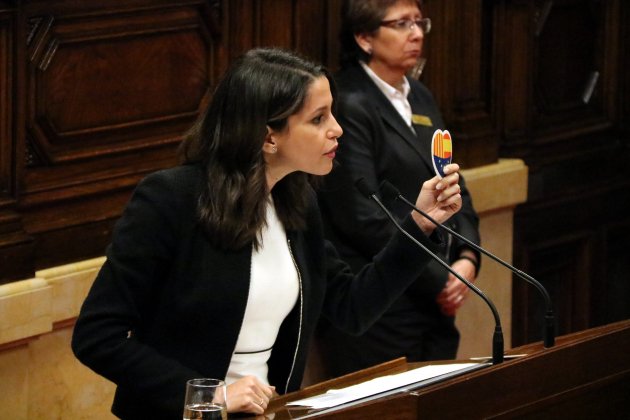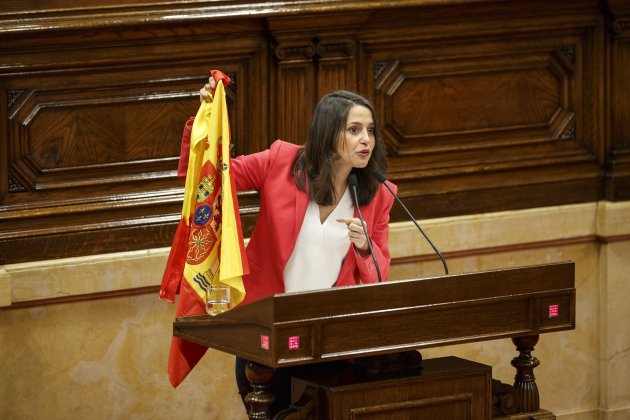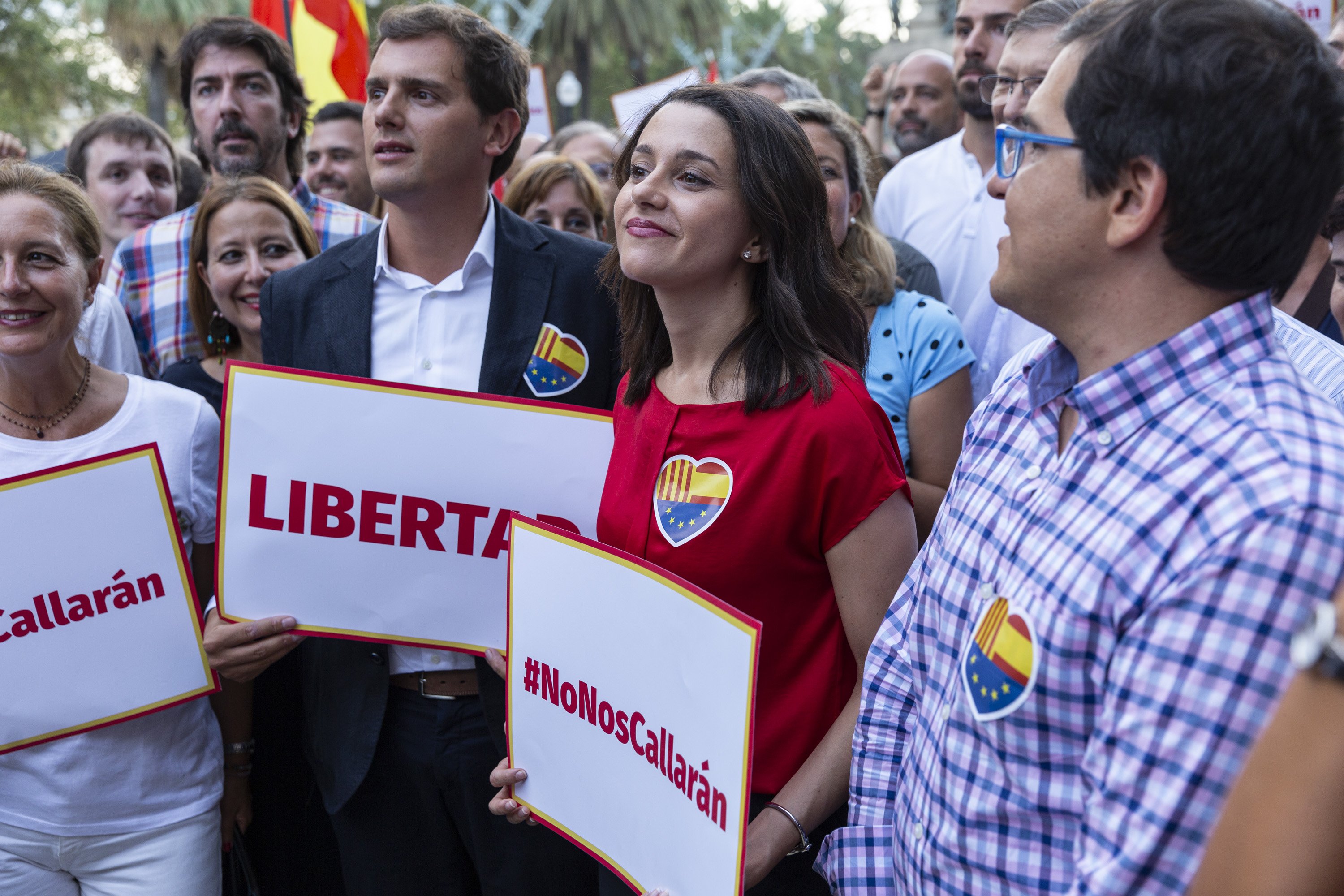To guarantee the "neutrality" of buildings and public spaces. That has been the mantra of the anti-independence party Ciudadanos (Cs) in Catalonia for months and they continually demand it. However, what they are really asking for, even if they call it "neutrality", is the removal of estelada flags and symbols related to the Catalan prisoners from public spaces. In no way are they asking for the removal of all types of symbols.
What the party led in Catalonia by Inés Arrimadas insists on, either through a legislative proposal or by calling for it from the parliamentary lectern and at press conferences, is to ensure the exclusive presence of the official symbols "that represent everybody". That is to say, under their definition of "neutrality", Spanish flags would be acceptable ―because they represent all Spaniards― but not pro-independence estelades. Moreover, they don't refer just to public buildings, but rather the definition of public space that they use includes "streets, squares, bridges, parks, gardens, fountains, lakes, beaches or street furniture in general".
The narrative, however, collapses under its own weight. The supposed "neutrality" that Ciudadanos insist on from the pro-independence parties is something they don't apply to themselves. Take a look at the five instances described below:
1. Banners relating to political prisoners (those of Venezuela)
Inés Arrimadas refused to meet president Quim Torra because the balcony of the Catalan government's Palau de la Generalitat was adorned by a banner in favour of the political prisoners, also featuring a yellow ribbon. According to Arrimadas, these banners made her feel unwelcome in the Catalan government palace because it was no longer "everyone's Generalitat".
The situation contrasts with that in the Community of Madrid, the regional government where the Popular Party (PP) governs with the support of Cs. In 2016, the then-president of the Community, Cristina Cifuentes, hung two banners from the façade calling for the release of the Venezuelan opposition politician Leopoldo López, a contradiction which Catalan Republican Left (ERC) deputy Gerard Gómez reminded Ciudadanos deputies of this week in the Catalan Parliament (link in Catalan).
Asi lucia hoy el palacio de la presidencia de la comunidad de Madrid, en honor y defensa de Leopoldo Lopez. pic.twitter.com/tXZXKFyDBI
— Santino Velota (@Santinovelota) 15 of marzo of 2016
Translation: This is how the presidency building of the Community of Madrid looks today, in honour and defence of Leopoldo López.
Moreover, this has not been the only instance in which controversial banners have been hung from this building in the centre of Madrid. In 2017, a banner marking the 20th anniversary of the death of the PP town councillor Miguel Ángel Blanco at the hands of ETA was displayed on the building. More recently, there was one congratulating the Real Madrid football team for their victory over Sevilla in the final of the European Supercup.
La ouerta del Sol tiene una pancarta en recuerdo a Miguel Ángel Blanco y la bandera de Venezuela. #16J #Madrid pic.twitter.com/SFx52dT7h0
— Bria (@LaBria21) 16 of julio of 2017
Madrid's Puerta del Sol has a banner in memory of Miguel Angel Blanco and the Venezuelan flag
2. "Neutral" beaches?
Ciudadanos also spent the summer cutting down yellow ribbons and demanding beaches "for everyone". This "neutrality" in terms of partisan symbols that they call for has not, however, prevented the party, through its platform Espanya Ciutadana, from overflying the Catalan coast with a small aircraft towing a banner which encourages beachgoers to pull out yellow bows for themselves. "The beaches are everyone's", reads the slogan on the banner.
¿Has visto ya los mensajes de la campaña #SonDeTodos?
— Ciudadanos (@CiudadanosCs) 16 of agosto of 2018
Nuestra Constitución defiende la igualdad; por eso @ESPCiudadana promueve el fin de la propaganda partidista en los espacios públicos.
¡Basta de exclusión! pic.twitter.com/8FZSuMcaLF
Have you seen the messages in the campaign "They're everyone's"? Our constitution defends equality; and for this reason Ciudadanos promotes the end of partisan propaganda in public spaces. Enough exclusion! - Ciudadanos
3. National days that are "not politicized"
This year on 23rd April, Sant Jordi's Day, Arrimadas called for an "apolitical day" that would be "for all Catalans" and demanded that other parties should not try to "appropriate it". In spite of this, her party erected its own marquee where party members offered passers-by balloons featuring the party symbol and stickers with their distinctive heart logo. The rose that Inés Arrimadas bore in her hand, unsurprisingly, matched the official colour of the party: orange.
Ella no vino ayer a apropiarse ni a politizar nada, claro. Una Diada de Sant Jordi; día del libro y la rosa, y en sus paradas había rosas naranjas... Y NI UN SÓLO LIBRO!! Propaganda, folletos y dípticos de C's, sí. Interesante... pic.twitter.com/0iEdP2Tf6b
— the Tonto'l People|Village (@TontolPoble) 24 of April 2018
She wasn't there to appropriate or politicise anything, of course. A Sant Jordi's day, a day of books and roses and at their stall there were orange roses... and not a single book! What there was, was Cs propaganda and pamphlets. Interesting... - El Tonto'l Poble
4. Ribbons no, hearts yes
Last May, Cs spokesperson Carlos Carrizosa staged an incident in which he removed a yellow bow from the Catalan government's empty seats in Parliament, saying that the yellow ribbon "does not represent anybody". Yet even though Cs came out against partisan symbols in the institutions, they have no problem in showing their own. Like the heart combining three flags that Arrimadas has displayed occasionally in parliamentary sessions, or the Spanish flag that she flourished at the parliamentary lectern last week, in spite of the party's rejection of "nationalisms".

PHOTO: ACN

PHOTO: Sergi Alcàzar
5. Balloons in schools
Finally, even though Ciudadanos say they think children must be isolated from political controversies and accuse the Catalan education system of indoctrinating children, in the Catalan election campaign last December, the team led by Arrimadas placed a stand outside a school in Pont de Vilomara, in Bages county, and gave away party balloons to the kids.
Bridge|Bank holiday of Vilomara...PSC with town councilors and mayor, distributing carnations and globe|balloon
C's orange globes|balloons on the door of the school of the people|village.....but not remained haviem that adoctrinavem us???? pic.twitter.com/O2WuzzxpgW — Judith (@JudithGr5) 18 of diciembre of 2017
Pont de Vilomara... Catalan Socialist Party with council members and mayor, giving out carnations and balloons.
Ciudadanos' orange balloons at the gate of the local school... but didn't we agree that WE were the ones who were doing the indoctrination? - Judith

